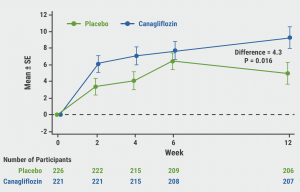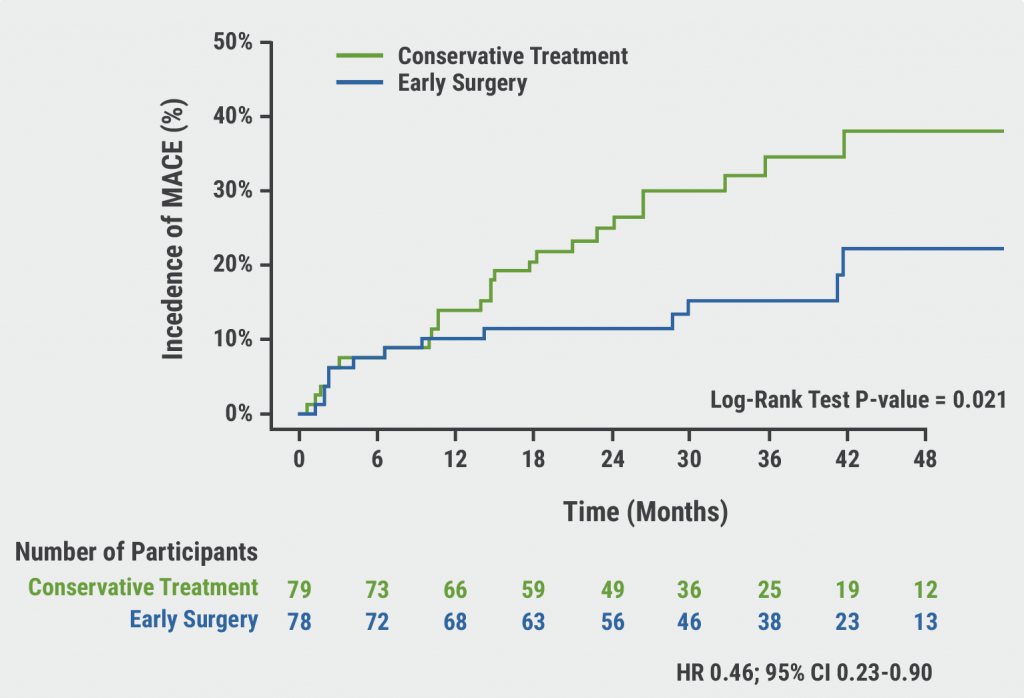Prof. John Spertus (University of Missouri-Kansas City, MO, USA) explained that canagliflozin has been shown to reduce HF outcomes and improve renal protection in patients with type 2 diabetes [1]. However, the agent has not yet been approved for a primary HF indication. The randomised, double-blind, placebo-controlled, phase 3 CHIEF-HF trial (NCT04252287) assessed the efficacy of canagliflozin on symptom improvement in patients with any type of HF. Participants could register for the trial via a smartphone application, after which the study medication and Fitbit devices were delivered. In total, 448 participants (mean age 63; 45% women) were randomised 1:1 to 100 mg canagliflozin once daily or placebo. The primary outcome was the 12-week change on the Kansas City Cardiomyopathy Questionnaire Total Symptom Score (KCCQ-TSS).
After 12 weeks, canagliflozin treatment evoked a mean 4.3-point increased change in KCCQ-TSS versus placebo (P=0.016). Notably, the effect was observed as early as 2 weeks after treatment initiation (see Figure). The number needed to treat to avoid a large deterioration in KCCQ-TSS (≥10-point decrease) was 15, and 27 patients needed to be treated to achieve a large improvement on this instrument. The results were similar across ejection fractions and type 2 diabetes status. No new safety issues of canagliflozin emerged during this study.
Figure: 12-week KCCQ-TSS improvement for canagliflozin [1]

Discussant Dr Eldrin Lewis (Stanford University, CA, USA) put the results of the CHIEF-HF trial in perspective. “We have seen a remarkable improvement in mortality rates of HF patients due to therapeutic advances in recent years. Up to 60% reductions in mortality rates can be achieved in these patients if they follow combination therapies. The SGLT2 inhibitors are the latest drug class to add to the progress in HF management. In addition, the current completely decentralised trial recruited a diverse treatment population (14% Black, 45% women, 59% preserved ejection fraction) and established excellent follow-up rates (98%). Therefore, the CHIEF-HF trial design shows benefits over standard randomised controlled trials. I am curious to see the long-term follow-up data of this trial regarding the persistence of established improvements in health-related quality of life.”
- Spertus J, et al. Canagliflozin: Impact on Symptoms, Physical Limitations and Quality of Life in Heart Failure (CHIEF-HF) Trial. LBS05, AHA 2021 Scientific Sessions, 13–15 November.
Copyright ©2021 Medicom Medical Publishers
Posted on
Previous Article
« DREAM-HF: MPC therapy for HFrEF did not meet primary endpoint Next Article
EMPULSE: Empagliflozin improves outcomes of acute heart failure »
« DREAM-HF: MPC therapy for HFrEF did not meet primary endpoint Next Article
EMPULSE: Empagliflozin improves outcomes of acute heart failure »
Table of Contents: AHA 2021
Featured articles
The scope of remote healthcare in hypertension and hyperlipidaemia
Atrial Fibrillation
New developments in remote diagnostics and monitoring of AF
Head-to-head: Efficacy of dabigatran versus warfarin on cognitive impairment
Posterior left pericardiotomy safe and effective in reducing atrial fibrillation
LAA ligation did not reduce recurrent atrial arrhythmias in persistent AF
Equal benefits of early rhythm control in AF subtypes
CVD Risk Reduction
Remote healthcare programme improves hypertension and lipid control
Novel oral PCSK9 inhibitor shows promising results for hypercholesterolaemia
REVERSE-IT: Interim analysis shows promising effect of bentracimab on ticagrelor reversal
No significant effect of aspirin on reducing cognitive impairment
Milvexian phase 2 data supports safety and efficacy for VTE prevention after total knee replacement
Network meta-analysis observes no clear effect of eicosapentaenoic acid on CV outcomes
Heart Failure
Empagliflozin efficacious in HF patients with preserved ejection fractions ≥50%
EMPULSE: Empagliflozin improves outcomes of acute heart failure
CHIEF-HF: Canagliflozin improves health status in heart failure
DREAM-HF: MPC therapy for HFrEF did not meet primary endpoint
Therapeutic approaches in heart failure with diabetes
Acute Coronary Syndrome
Ticagrelor cessation: early CABG non-inferior to delayed surgery
Distinguishing patients before AMI based on plaque morphology
Vascular Diseases: PVD
Rivaroxaban regimen beneficial after revascularisation for claudication
LIBERTY 360 shows quality-of-life improvements after peripheral vascular intervention
Deficient treatment outcomes after PVI in Black and low-income adults with PAD
REDUCE-IT: Cardiovascular risk reduction with icosapent ethyl in PAD
Vascular Diseases: CAD
Long-term reduced risk of CV events with ticagrelor plus aspirin after CABG
Early surgery outperforms conservative management in asymptomatic severe aortic stenosis
External support device for SVG grafts in CABG surgery shows promise
COVID-19 & the Heart
Blood pressure control disrupted during the pandemic
Icosapent ethyl did not reduce the risk of hospitalisation in COVID-19
Neutral effect of P2Y12 inhibitors in non-critical COVID-19 hospitalisations
COVID-19 mRNA vaccination benefits outweigh the risk for myocarditis
Other
2021 Guideline for Chest Pain: Top 10 takeaways
Accurate ejection fraction assessment in paediatric patients via artificial intelligence
Concomitant tricuspid annuloplasty reduces treatment failure in moderate tricuspid regurgitation
Related Articles

January 14, 2022
No significant effect of aspirin on reducing cognitive impairment

© 2024 Medicom Medical Publishers. All rights reserved. Terms and Conditions | Privacy Policy
HEAD OFFICE
Laarderhoogtweg 25
1101 EB Amsterdam
The Netherlands
T: +31 85 4012 560
E: publishers@medicom-publishers.com

